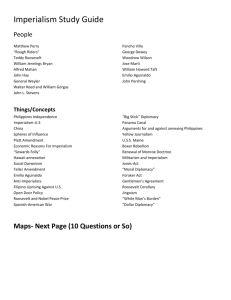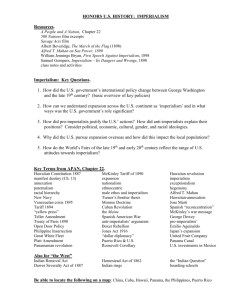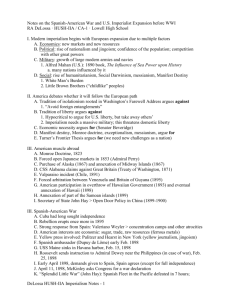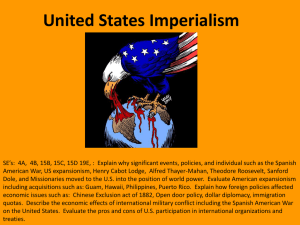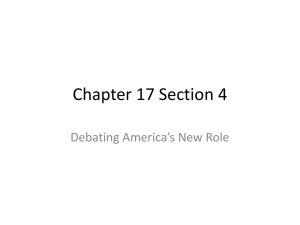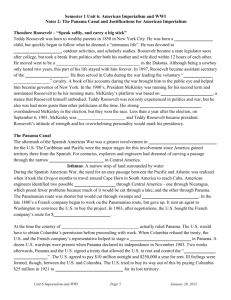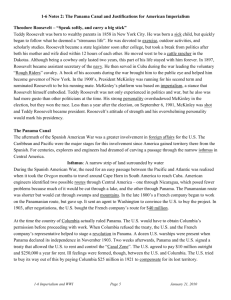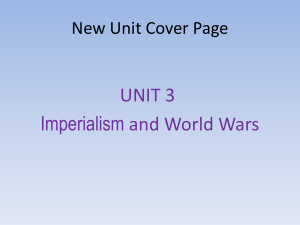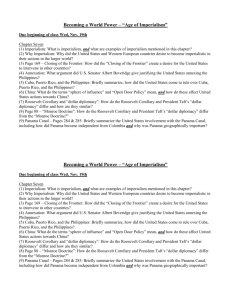Imperialism Study Guide
advertisement
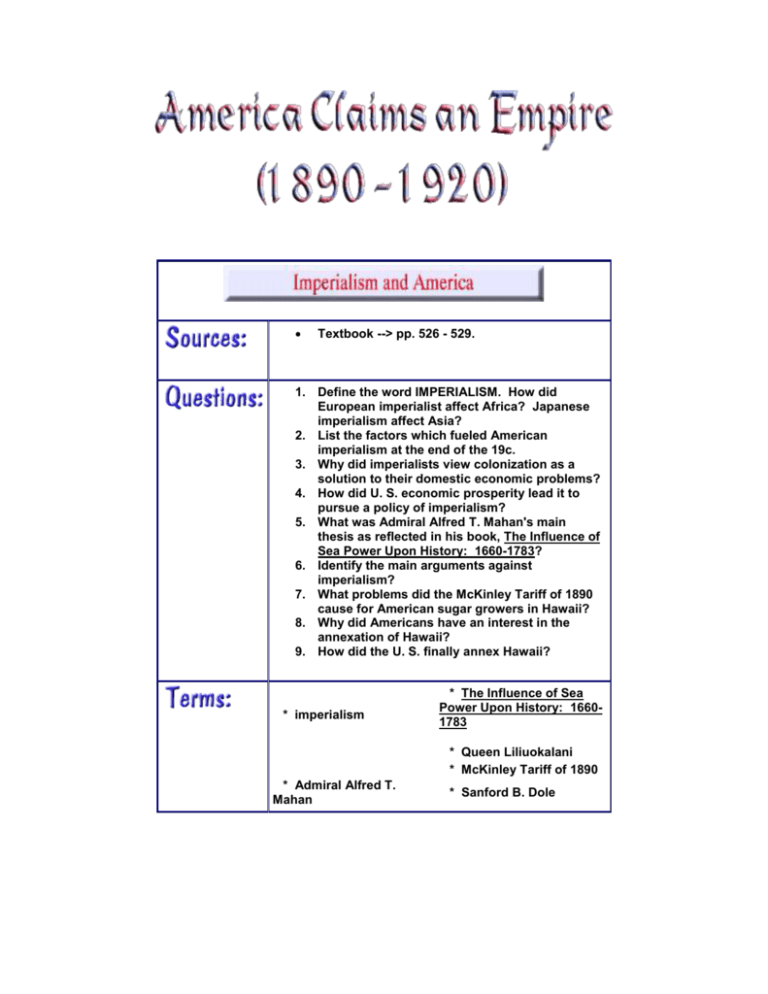
Textbook --> pp. 526 - 529. 1. Define the word IMPERIALISM. How did European imperialist affect Africa? Japanese imperialism affect Asia? 2. List the factors which fueled American imperialism at the end of the 19c. 3. Why did imperialists view colonization as a solution to their domestic economic problems? 4. How did U. S. economic prosperity lead it to pursue a policy of imperialism? 5. What was Admiral Alfred T. Mahan's main thesis as reflected in his book, The Influence of Sea Power Upon History: 1660-1783? 6. Identify the main arguments against imperialism? 7. What problems did the McKinley Tariff of 1890 cause for American sugar growers in Hawaii? 8. Why did Americans have an interest in the annexation of Hawaii? 9. How did the U. S. finally annex Hawaii? * imperialism * The Influence of Sea Power Upon History: 16601783 * Queen Liliuokalani * McKinley Tariff of 1890 * Admiral Alfred T. Mahan * Sanford B. Dole Textbook --> pp. 530 - 534. 1. Who was José Martí? Why did he destroy American-owned sugar mills and plantations in Cuba in the 1890s? 2. How did yellow journalism affect American attitudes toward the Cuban revolt? 3. What were the factors which promoted American support for Cuban independence during the 1890s? 4. Create a TIMELINE which shows the events that served as a catalyst in pushing the U. S. toward war with Spain. 5. Why was so much importance attached to the American victory in the Philippines during the Spanish-American-Cuban War? 6. How prepared were U. S. troops for war in 1898? 7. What was the myth and what was the reality regarding the events surrounding the Rough Riders and the American victory in the Battle of San Juan Hill? 8. List the major provisions of the Treaty of Paris of 1898? 9. Why did the U. S. annex the Philippines? * José Martí * * General Valeriano Weyler * yellow journalism * jingoism * You furnish the pictures and I will furnish the war! * Remember the Maine! * Admiral George Dewey * De Lôme Letter * concentration camps * He's got no more backbone than a chocolate eclair! * Treaty of Paris (1898) * * U. S. S. Maine * Battle of Manila Bay * Rough Riders * Battle of San Juan Hill * A splendid little war Textbook --> pp. 535 - 541. 1. What strategic importance did Puerto Rico hold for the U. S.? 2. How did the Foraker Act benefit the U. S.? 3. What was the importance of the Supreme Court ruling in the Insular Cases to U. S. colonialism? How did their decision impact American territorial expansion in the future? 4. What are the pros and cons of Puerto Rican statehood versus a continuance of commonwealth status? 5. What were the provisions of the Platt Amendment? How did they define the role of the U. S. in Cuba following the SpanishAmerican-Cuban War? 6. Why did the U. S. want to control Cuba in the early 20c? 7. How did the Americans treat the Filipinos after the Spanish-American-Cuban War? 8. What were the motives of the Filipinos like Emilio Aguinaldo and the Americans in the Filipino-American War of 1899-1902? 9. What was the outcome of this war? 10. Define the term SPHERE OF INFLUENCE. Explain its relevance to the political status of China at the turn of the last century? 11. List the principles of the Open Door Notes as proposed by Secretary of State John Hay. What were the reactions of the European nations who were already involved in China to them? 12. What were the circumstances surrounding the Boxer Rebellion? What was the U. S. position regarding this incident? 13. How did the Open Door Policy reflect deeply held American beliefs about the U. S. industrial capitalist economy? 14. What were some of the anti-imperialist arguments that were made in the beginning of the 20c? * * * * * Foraker Act (1900) * Insular Cases (1901) * * Guantánamo Bay * * * * Emilio Aguinaldo William Howard Taft sphere of influence John Hay * Teller Amendment * Open Door Notes (1898) * Platt Amendment (1901) * Boxer Rebellion * protectorate Textbook --> pp. 542 - 547. 1. What were the causes of the Russo-Japanese War of 1904-1905? Why did the Japanese decide on mediation? Why did they ask Teddy Roosevelt to be their mediator? 2. What was the status of U. S.-Japanese relations in the early 20c? 3. Why did the U. S. want a canal through the Isthmus of Panama? 4. How did the U. S. go about gaining control of the land necessary to build the Panama Canal? 5. What was the intent of the Roosevelt Corollary to the Monroe Doctrine? What was its impact on the role of the U. S. in the Western Hemisphere? 6. How were the "Big Stick" and "Dollar" Diplomacies alike? 7. Why did President Wilson refuse to recognize General Victoriano Huerta's government? 8. Create a SEQUENCE-OF-EVENTS CHART showing the changes in leadership in Mexico in the early 20c and the U. S. response to those changes. 9. Why did the U. S. get so involved in Mexican affairs in the early 20c? 10. How were the approaches of Teddy Roosevelt and Woodrow Wilson to foreign affairs different? * Russo-Japanese War (1904-5) * * Treaty of Portsmouth (1905) * "Great White Fleet" * Panama Canal * "Missionary Diplomacy" * Porfirio Díaz * Victoriano Huerta * Battle of Veracruz (1914) * Venustiano Carranza * * * * Speak softly and carry a big stick! * "Dollar Diplomacy" * Francisco "Pancho" Villa * General John "Black Jack" Pershing * Roosevelt Corollary
